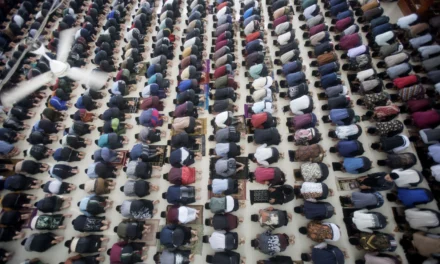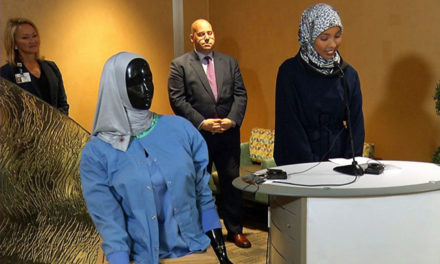A group of University of Texas at Dallas students made headlines in 2013 by establishing the first Muslim fraternity in America. Now two Dallasites have released a documentary that follows them from their first rush week.
The 90-minute documentary, Kufi Krew: An American Story, is named for the cap devout Muslims often wear. The film opens with an all too common scene: Angry people at a public protest, this one in Garland, shouting about Islam. One woman declares, “We are standing against the most brutal and extreme ideology on the face of the earth.”
But from such a start, Kufi Krew goes where one might never expect — not for a film about a college fraternity: We witness the birth of a child, we follow a secret, long-distance romance.
And we discover the difficulties in determining compass directions — if you need to face the east so you can pray, and you happen to be stuck in a parking lot. Inside a car at a Walmart, a frustrated Mohammed points to his cellphone and tells the driver, Humza, “Anyways, here’s west, here’s east. So you’re gonna have to turn the car around.”
Photographer Dylan Hollingsworth heard about the formation of the fraternity at UT Dallas in 2013 and thought it was a story worth pursuing. Hollingsworth and co-director Wheeler Sparks had worked and traveled in the Middle East and had often been welcomed warmly there.

But they found such stories were not that welcome back here.
“So I think both of us were really looking to make a small contribution to the conversation about Islam in America,” Hollingsworth said.
Kufi Krew follows a handful of the original 13 members of the fraternity, called ALM. The letter stands for Alif Laam Meem, the three letters that often open chapters of the Quran. In the Greek fraternity world, the letters stand for Alpha Lambda Mu.
What started as a possible photo feature turned into Spark’s and Hollingsworth’s first, full-length documentary, with the two as co-writers, co-directors, photographers and editors.
While the college students and their family members appear in the film, only their first names are used. They declined to be interviewed about the film.
“There was a level of privacy and anonymity,” Hollingsworth said, “that a lot of members of the fraternity wanted.”

The basic question Kufi Krew asks is, why would young American Muslim men — many of whom chose to abstain from drinking or dating before marriage — why would they want to create an American-style college fraternity?
Have they not watched Animal House? Revenge of the Nerds?
The Sweetheart of Sigma Chi?
Ali, the 19-year-old co-founder of the fraternity, explained why such young men would seek the company, the help of people like themselves.
“These young, college-age Muslim-American men are lost. That’s what I feel like,” Ali said. “A lot of them have to — by themselves — figure out what it means to be a Muslim. I mean, how do you define establishing a relationship with God?”
“And at the same time, defining yourself within a country that has had quite a few problems with Muslims within the past, you know, couple of decades?”

For these college students, the fraternity becomes a gathering place, a sounding board, for them to work out the tensions between family, religion and the oft-times antagonistic country that many have lived in their entire lives.
So the filmmakers had a fascinating start for a story. The questions for them became, where will it go? And how will they know when the film should end?
“A lot of how the story unfolded certainly wasn’t anything that was planned,” said Hollingsworth. “It’s just if you hang out with someone with a camera rolling for long enough, at some point, reality will become extraordinary.”
The documentary does capture the ordinary, male-bonding activities of a fraternity: barbeques, games of dodgeball, boxing matches. But there are also trips to Istanbul and Paris – and there are the deep emotional strains caused by the clash of the personal and the religious.

But mostly Kufi Krew captures what Ali, the fraternity co-founder, calls the construction of a new identity — by a young generation of American Muslims trying to be fully Muslim and fully American.
“Most of us are born here,” Ali said to pledges. “Most of us were raised here. We know nothing else besides America. I don’t know about you guys, but I’m tired of telling people we’re not terrorists. We don’t hate our women. It’s time to tell people who we are.”
It’s nine years later now. And these days, there are seven chapters of the ALM fraternity — including ones at Texas Tech, UT Austin, the University of Wisconsin-Madison and the University of California San Diego.
By Jerome Weeks













